仁爱版英语七年级上册Unit3Topic3SectionA
- 格式:ppt
- 大小:7.95 MB
- 文档页数:25
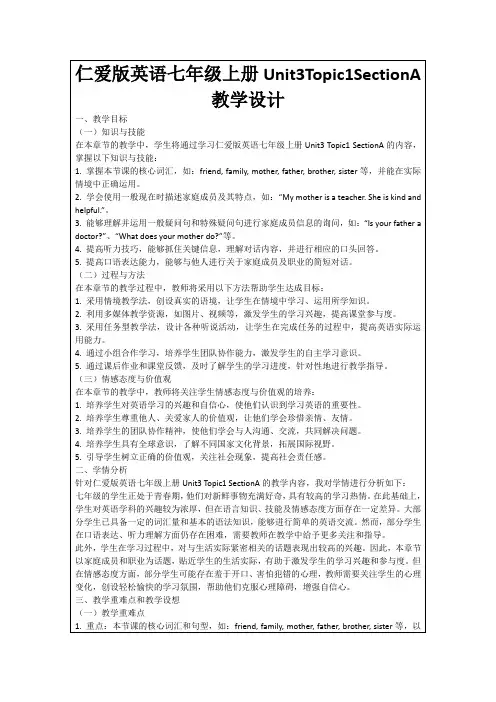
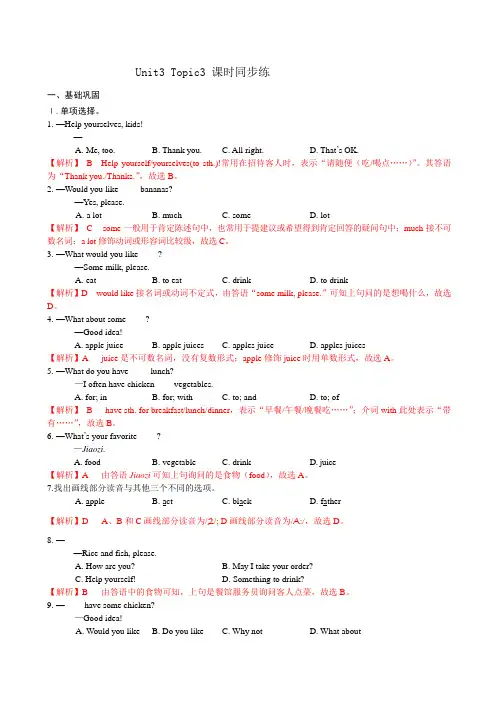
Unit3 Topic3 课时同步练一、基础巩固Ⅰ.单项选择。
1. —Help yourselves, kids!—______A. Me, too.B. Thank you.C. All right.D. That’s OK.【解析】B Help yourself/yourselves(to sth.)!常用在招待客人时,表示“请随便(吃/喝点……)”。
其答语为“Thank you./Thanks.”,故选B。
2. —Would you like ____ bananas?—Yes, please.A. a lotB. muchC. someD. lot【解析】C some一般用于肯定陈述句中,也常用于提建议或希望得到肯定回答的疑问句中;much接不可数名词;a lot修饰动词或形容词比较级,故选C。
3. —What would you like ____?—Some milk, please.A. eatB. to eatC. drinkD. to drink【解析】D would like接名词或动词不定式,由答语“some milk, please.”可知上句问的是想喝什么,故选D。
4. —What about some ____?—Good idea!A. apple juiceB. apple juicesC. apples juiceD. apples juices【解析】A juice是不可数名词,没有复数形式;apple修饰juice时用单数形式,故选A。
5. —What do you have ____ lunch?—I often have chicken ____vegetables.A. for; inB. for; withC. to; andD. to; of【解析】B have sth. for breakfast/lunch/dinner,表示“早餐/午餐/晚餐吃……”;介词with此处表示“带有……”,故选B。
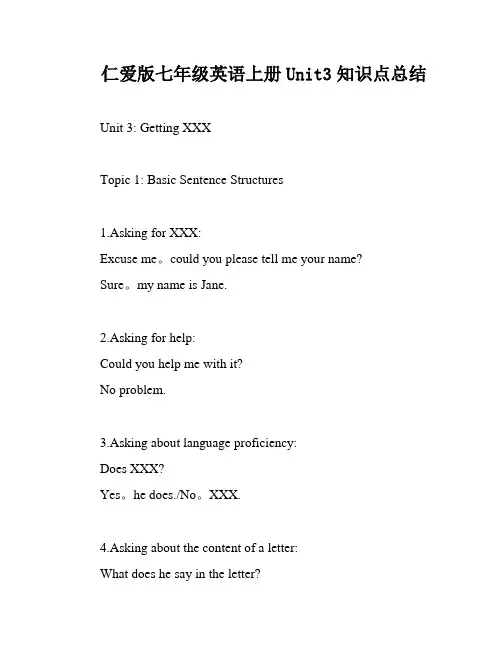
仁爱版七年级英语上册Unit3知识点总结Unit 3: Getting XXXTopic 1: Basic Sentence Structures1.Asking for XXX:Excuse me。
could you please tell me your name?Sure。
my name is Jane.2.Asking for help:Could you help me with it?No problem.3.Asking about language proficiency:Does XXX?Yes。
he does./No。
XXX.4.Asking about the content of a letter:What does he say in the letter?5.Describing friendship:Jane。
Sally。
and I are good friends.6.Describing mutual help:We often help each other.7.Expressing different degrees of liking:Many students in our class like English a lot。
but I like it a little.What about you。
Sam?No。
I don't like English at all.Useful Phrases:9.Pen palXXX11.A lot12.Not。
at all13.Each other14.A little15.Very much16.A lot of17.Every dayPersonal Pronouns and Simple Present XXXXXX or things。
and they have ns in person。
singular or plural。
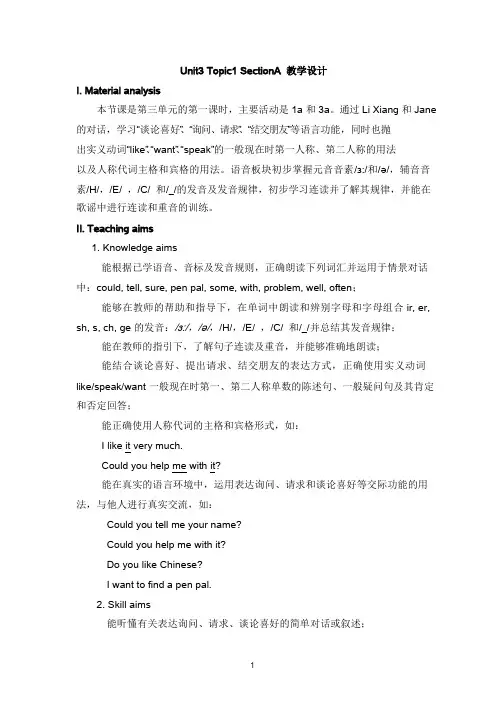
Unit3 Topic1 SectionA 教学设计Ⅰ. Material analysis本节课是第三单元的第一课时,主要活动是1a 和3a。
通过Li Xiang 和Jane 的对话,学习“谈论喜好”、“询问、请求”、“结交朋友”等语言功能,同时也抛出实义动词“like”、“want”、“speak”的一般现在时第一人称、第二人称的用法以及人称代词主格和宾格的用法。
语音板块初步掌握元音音素/з:/和/ə/,辅音音素/H/,/E/ ,/C/ 和/_/的发音及发音规律,初步学习连读并了解其规律,并能在歌谣中进行连读和重音的训练。
Ⅱ.Teaching aims1. Knowledge aims能根据已学语音、音标及发音规则,正确朗读下列词汇并运用于情景对话中:could, tell, sure, pen pal, some, with, problem, well, often;能够在教师的帮助和指导下,在单词中朗读和辨别字母和字母组合ir, er, sh, s, ch, ge 的发音:/з:/,/ə/,/H/,/E/ ,/C/ 和/_/并总结其发音规律;能在教师的指引下,了解句子连读及重音,并能够准确地朗读;能结合谈论喜好、提出请求、结交朋友的表达方式,正确使用实义动词like/speak/want 一般现在时第一、第二人称单数的陈述句、一般疑问句及其肯定和否定回答;能正确使用人称代词的主格和宾格形式,如:I like it very much.Could you help me with it?能在真实的语言环境中,运用表达询问、请求和谈论喜好等交际功能的用法,与他人进行真实交流,如:Could you tell me your name?Could you help me with it?Do you like Chinese?I want to find a pen pal.2. Skill aims能听懂有关表达询问、请求、谈论喜好的简单对话或叙述;1能就表达询问、请求、谈论喜好等的话题进行交流;能正确地朗读对话,注意重音和连读;能写出表达询问、请求和谈论喜好的简单句子或者小短文。
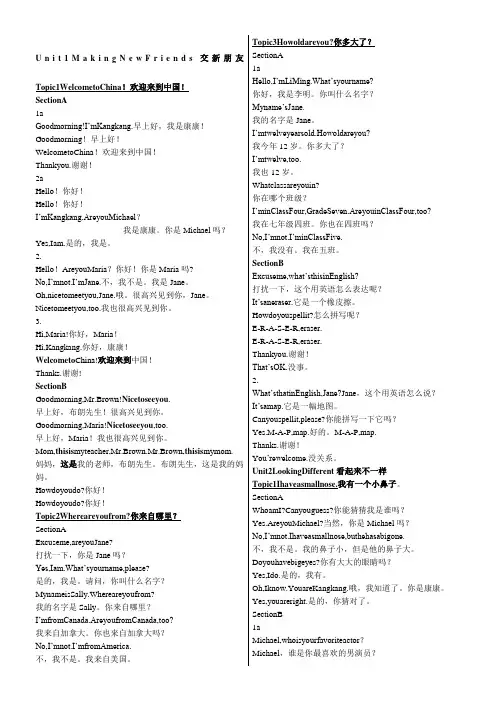
U n i t1M a k i n g N e w F r i e n d s交新朋友Topic1WelcometoChina!欢迎来到中国!SectionA1aGoodmorning!I’mKangkang.早上好,我是康康!Goodmorning!早上好!WelcometoChina!欢迎来到中国!Thankyou.谢谢!2aHello!你好!Hello!你好!I’mKangkang.AreyouMichael?我是康康。
你是Michael吗?Yes,Iam.是的,我是。
2.Hello!AreyouMaria?你好!你是Maria吗?No,I’mnot.I’mJane.不,我不是。
我是Jane。
Oh,nicetomeetyou,Jane.哦。
很高兴见到你,Jane。
Nicetomeetyou,too.我也很高兴见到你。
3.Hi,Maria!你好,Maria!Hi,Kangkang.你好,康康!Welcometo China!欢迎来到中国!Thanks.谢谢!SectionBGoodmorning,Mr.Brown!Nicetoseeyou.早上好,布朗先生!很高兴见到你。
Goodmorning,Maria!Nicetoseeyou,too.早上好,Maria!我也很高兴见到你。
Mom,thisis myteacher,Mr.Brown.Mr.Brown,thisis mymom. 妈妈,这是我的老师,布朗先生。
布朗先生,这是我的妈妈。
Howdoyoudo?你好!Howdoyoudo?你好!Topic2Whereareyoufrom?你来自哪里?SectionAExcuseme,areyouJane?打扰一下,你是Jane吗?Yes,Iam.What’syourname,plea se?是的,我是。
请问,你叫什么名字?MynameisSally.Whereareyoufrom?我的名字是Sally。
![Unit3Topic3SectionA教案(大全五篇)[修改版]](https://uimg.taocdn.com/c63e3c2676a20029bc642db6.webp)
第一篇:Unit 3 Topic 3 Section A 教案黑龙江省哈尔滨五常市私立万宝中学校英语课程改革(七年级上)教师专用教案(Unit 3)Topic 3What would you like to drink?Section A (2课时)第1课时1. Help yourselves! 译为:请随便吃/喝!该句为主人招待客人用餐时的常用语。
如果被招待者是一个人,用help yourself; 若是两人或两人以上,用“Help yourselves.”另外help yourself to…译为“请随便吃/喝些……”▲【例句】请随便吃些苹果。
Help yourself to some apples. 我可以喝杯饮料吗?Can I have a drink, please? 请自用。
Help yourself.★【拓展】如果主人要请客人吃什么东西,则用Help yourself/yourselves to sth. ▲【例句】汤姆,请随便吃些橘子。
Help yourself/yourselves to some oranges, Tom.孩子们,请随便吃些苹果。
Help yourselves to some apples, boys. 2. I would like an egg and some fish. 译为:我想一个鸡蛋和一些鱼肉。
(1) would like 译为:要,想要,愿意,喜欢,希望。
would like 要用于婉转地提出请求、建议或某种看法,在意思上相当于want,但语气比want更委婉。
would like后面可以跟名词或代词,如果跟动词,一般是不定式形式(to do sth.)。
would like 在口语常说成’d like,不受主语人称和数的变化影响。
▲【例句】①我想要一个鸡蛋。
I’d like an egg. = I want an egg.②他想要喝果汁。
He would like to drink juice. = He wants to drink juice. (2) would like 的一般疑问句形式为: Would +主语+like…? Would you like…译为:“你想要……吗”用于礼貌地提出建议或发出邀请,有时含有请求的意味。

Unit3 Getting TogetherTopic1 基本句型1.Excuse me,could you please tell me your name? Sure,my name is Jane.2.Could you help me with it? No problem.3.Does he speak some Chinese? Yes,he does./No,he doesn`t.He speaks English.4.What does he say in the letter?5.Jane,Sally and I are good friends.6.We often help each other.7.Many students in our class like English a lot,but I like it a little.8.What about you,Sam? No,I don`t like English at all.词组9.pen pal10.help sb.with sth.11. a lot12.not...at all13.each other 14.a little15.very much16.a lot of17.every day1.人称代词的主格和宾格。
(1)主格的人称代词作句子中的主语。
e.g.We are good friends. 我们是好朋友。
It is my cat. 它是我的猫。
(2)宾格的人称代词作动词或介词的宾语。
e.g.We all like her very much. 我们都非常喜欢她。
Please help me with Chinese. 请帮助我学习汉语。
2.实义动词的一般现在时。
实义动词表示动作或状态,在句中能单独作谓语。
在一般现在时中,一般用动词原形,但如果主语是第三人称单数,动词必须用第三人称单数形式。
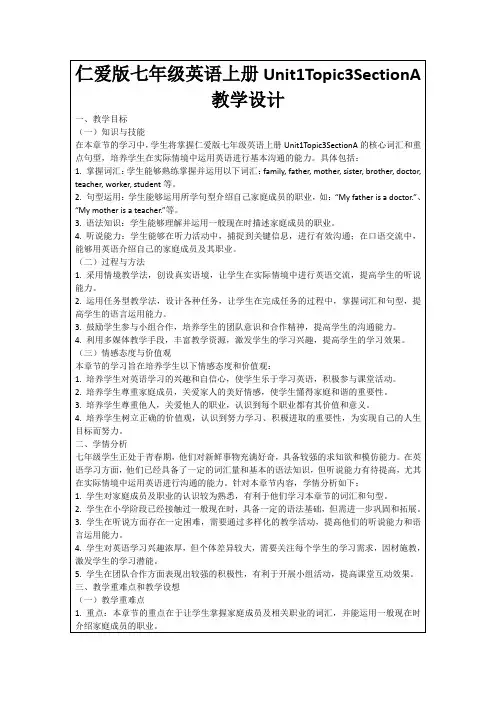
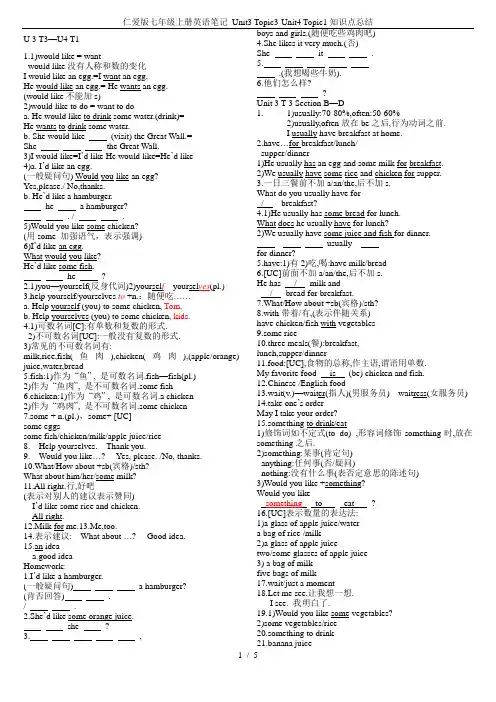
U 3 T3—U4 T11.1)would like = wantwould like没有人称和数的变化I would like an egg.=I want an egg.He would like an egg.= He wants an egg.(would like不能加s)2)would like to do = want to doa. He would like to drink some water.(drink)=He wants to drink some water.b. She would like (visit) the Great Wall.=She the Great Wall.3)I would like=I’d like He would like=He’d like4)a. I’d like an egg.(一般疑问句) Would you like an egg?Yes,please./ No,thanks.b. He’d like a hamburger.he a hamburger?. / .5)Would you like some chicken?(用some 加强语气,表示强调)6)I’d like an egg.What would you like?He’d like some fish.he ?2.1)you—yourself(反身代词)2)yoursel f---yoursel ves(pl.)3.help yourself/yourselves to +n.:随便吃……a. Help yourself (you) to some chicken, Tom.b. Help yourselves (you) to some chicken, kids.4.1)可数名词[C]:有单数和复数的形式.2)不可数名词[UC]:一般没有复数的形式.3)常见的不可数名词有:milk,rice,fish(鱼肉),chicken(鸡肉),(apple/orange) juice,water,bread5.fish:1)作为“鱼” , 是可数名词.fish—fish(pl.)2)作为“鱼肉”, 是不可数名词.some fish6.chicken:1)作为“鸡” , 是可数名词.a chicken2)作为“鸡肉”, 是不可数名词.some chicken7.some + n.(pl.),some+ [UC]some eggssome fish/chicken/milk/apple juice/rice8.---Help yourselves.---Thank you.9.---Would you like…? ---Yes, please. /No, thanks.10.What/How about +sb(宾格)/sth?What about him/her/some milk?11.All right.行,好吧(表示对别人的建议表示赞同)---I’d like some rice and chicken.---All right.k for me.13.Me,too.14.表示建议:---What about …? ---Good idea.15.an ideaa good ideaHomework:1.I’d like a hamburger.(一般疑问句) a hamburger?(肯否回答) ./ .2.She’d like some orange juice.she ?3. , boys and girls.(随便吃些鸡肉吧)4.She likes it very much.(否)She it .5..(我想喝些牛奶).6.他们怎么样??Unit 3 T 3 Section B—D1.1)usually:70-80%,often:50-60%2)usually,often放在be之后,行为动词之前.I usually have breakfast at home.2.have…for breakfast/lunch/supper/dinner1)He usually has an egg and some milk for breakfast.2)We usually have some rice and chicken for supper.3.一日三餐前不加a/an/the,后不加s.What do you usually have for/ breakfast?4.1)He usually has some bread for lunch.What does he usually have for lunch?2)We usually have some juice and fish for dinner.usuallyfor dinner?5.have:1)有2)吃,喝:have milk/bread6.[UC]前面不加a/an/the,后不加s.He has / milk and/ bread for breakfast.7.What/How about +sb(宾格)/sth?8.with带着/有,(表示伴随关系)have chicken/fish with vegetables9.some rice10.three meals(餐):breakfast,lunch,supper/dinner11.food:[UC],食物的总称,作主语,谓语用单数.My favorite food is (be) chicken and fish.12.Chinese /English food13.wait(v.)—waiter(指人)(男服务员)---waitress(女服务员)14.take one’s orderMay I take your order?15.something to drink/eat1)修饰词如不定式(to do) ,形容词修饰something时,放在something之后.2)something:某事(肯定句)anything:任何事(否/疑问)nothing:没有什么事(表否定意思的陈述句)3)Would you like +something?Would you likesomething to eat ?16.[UC]表示数量的表达法:1)a glass of apple juice/watera bag of rice /milk2)a glass of apple juice---two/some glasses of apple juice3) a bag of milk---five bags of milk17.wait/just a moment18.Let me see.让我想一想.I see. 我明白了.19.1)Would you like some vegetables?2)some vegetables/rice20.something to drink21.banana juice----Section C1.eat out2.eat---eating(现在分词)3.would like to doWould you like to have (have) dinner with me?4.have / breakfast/lunch/supper/dinner5.with sb(宾格)6.Would you like to have lunch with him?7.Yes, I’d like/love to.(to不能省略)8.1)May/can I help you?=What can I do for you?2)情态动词may/can/could+动原May I help (help) you?9.sir—madam(对应词)10.What would you liketo eat (eat)?11.Why not+动原? =Why don’t you +动原?Why not study (study) with me? = Why don’t you study with me?12.表示建议:1)What about…? 2)Why not…?肯定回答:Good idea.13.Here you are.14.---Would you like sth to drink?---Yes,please./No,thanks.Section D1.in+地点: in China2.many+n(pl.)many friends3.1)all,bothall指三者或三者以上“都”both指两者“都”2)all,both放在be之后,行为动词之前They are all students.We all like school.4.be kind to sbThe teacher is kind to us.5.have dinner with them6.such as +若干例子7.Sichuan food8.be glad to do sthObama is glad to visit (visit) the Great Wall.9.1)here,there是介词,前不加介词.2)be here/thereI’m glad to be (be) here.10.let sb do sthLet me (I) see (see).Homework:1.他晚饭通常吃什么?he usually?2.你可以点菜了吗??3.Tom,为什么不随便吃些汉堡包呢,?,Tom?4.你想喝些什么东西吗?来两杯香蕉汁.Would you like?.5.She’s glad (be) there.6.I’d like (work) with you.7.Would you like something(say)?8.Why not (tell) him about it.= him about it.9.他对我很友善.He .10.I usually have some rice for lunch.usually for lunch?1.---Do you like…?---Yes, I like …very much/a lot/a little.(No, I don’t like …at all.)Section D1.at / homeHe has a dog at home.2.it’s, its(它是)(它的)a cat. name’s Mimi.3.Tommy =Tom4.Zhou Lan likes it a lot.= Zhou Lan likes it very much.(否)Zhou Lan doesn’t like it at all.5.some,anyShe has some pets.(否)She doesn’t have any pets.(疑问)Does she have any pets?6.1)人称代词:主格---宾格I—me,you-you,he-him,she-her,it-itwe-us,they-them2)形物代—名物代my-mine,your-yours,his-his,her-hers,its-its,our-ours,their-theirsThis is a girl. name is Lily. is twelve. We like .(Her,She,her)Unit 4 T1 Section A1.What can I do for you?=Can/May I help you?2.madam---sir(对应词)3.want to do = would like to do1)She wants to have milk and bread.=She would like to have milk and bread.2)Would you like a glass of apple juice?=Do you want a glass of apple juice?3)Would she like some vegetables?=Does she want any vegetables?4.clothes:衣服的总称,复数名词,作主语时,谓语用复数形式。

Unit 1 Topic 1 Welcome to China!1.好的,令人愉快的_______________2.早晨,上午___________3.我___________4.是___________5.欢迎___________6.到,对,向___________7.中国___________8.谢谢,感谢___________9.你,你们___________10.这(那)个,这(那)些___________11.美国___________12.英国___________13.喂,你好___________14.是___________15.是,同意___________16.不,不是,没有___________17.不,没有___________18.令人愉快的,友好的___________19.结识,遇见___________20.也,太,很___________21.感谢,谢谢___________22.遇见,看到,明白___________23.妈妈___________24.这个,这___________25.是___________26.我的___________27.老师,教师___________28.怎样,多少,多么___________29.做___________30.爸爸___________31.女士,小姐___________32.女士___________33.下午___________34.再见___________35.健康的,晴朗的___________36.和___________37.(口语)安然无恙,好,行___________38.在这里___________Unit1 Topic 2Where are you from1)原谅___________2)我(宾格)___________3)什么___________4)你的,你们的___________5)名字,名称___________6)请___________7)在(到)哪里___________8)来自,从___________9)加拿大___________10)美国___________11)日本___________12)英格兰___________13)他/她/它们___________14)谁___________15)他___________16)她___________17)看,看起来___________18)电话,号码,数字___________19)它___________20)很,非常___________21)非常,很;多少,许多,大量___________22)非常,很(词组)___________23)那,那个___________24)零___________25)一___________26)二___________27)三___________28)四___________29)五___________30)六___________31)七___________32)八___________33)九___________34)十___________35)她的___________36)家族,家庭___________ Unit1 Topic 31.What class are you in2.十二___________3.年___________4.…岁的,老的,旧的___________5.班级,课___________6.在…里(内,上),用…___________7.年级___________8.十一___________9.十三___________10.十四___________11.十五___________12.十六___________13.十七___________14.十八___________15.十九___________16.二十___________17.英语;英国的,英国人的___________18.橡皮,黑板擦___________19.地图___________20.钢笔,笔___________21.铅笔___________22.书桌.___________23.一(个,件……)___________24.拼写___________25.一(个,件……)___________26.能,会___________27.苹果___________28.玩具___________29.试,试图,努力___________30.再一次___________31.那些___________32.书,本子,预约,预订___________33.这些___________34.让___________35.帮助___________36.尺子___________37.小汽车,轿车___________38.蛋___________39.柑橘; 橙子,橘;橘黄色的___________40.公共汽车___________41.盒,箱___________42.现在___________43.学校___________44.他的___________45.相同的___________46.但是,可是___________47.朋友___________48.初级的___________49.高的;在高处,向高处___________50.初中___________Review of Unit 11)女孩___________2)我们___________3)学生___________4)讲,说,谈话___________I have a small nose.1.猜___________2.有,吃,喝___________3.小的___________4.鼻子___________5.有(第三人称单数形式)___________6.大的___________7.眼睛___________8.知道,认识___________9.正确的,右边的;右边___________10.耳朵___________11.头发___________12.头___________13.脸___________14.脖子___________15.嘴___________16.圆形的___________17.长的___________18.宽的___________19.最喜爱的;特别喜欢的(人或物)___________20.演员___________21.汉语的,中国人的;中国人,汉语___________22.Do 的第三人称单数___________23.胳膊;_______________24.手;___________26.脚,英尺___________27.短的,矮的___________28.男孩___________29.来;来到___________30.出生于,来自___________31.姐妹___________32.不同的___________33.小刀___________写出下列词的复数形式:1)egg___________2) banana___________3)bus___________4)box___________5)class___________6)watch___________7)baby ___________8)family___________9)boy___________10) monkey___________11)knife___________12)wolf ___________13)wife___________14)shelf___________15)foot___________16)man___________17)woman___________18)child ___________What does she look like1)黑色的;黑色___________2)金黄色的;浅色的___________3)蓝色的;蓝色___________4)颜色;给…着色;涂色___________5)粉红色;粉红色的___________6)红色;红色的___________7)紫色;紫色的___________8)棕色;棕色(的)___________9)灰色;灰色(的)___________10)黄色;黄色(的)___________11)绿色(的);___________12)白色;白色的___________13)给___________14)信,字母___________15)对不起,抱歉;难过的___________16)像;跟…一样;喜欢;喜爱___________17)高的___________18)会;将___________19)给,因为,对于___________20)年轻的___________21)男人___________22)成年女子,妇女___________23)雪人___________24)想要;需要___________25)买___________26)T恤衫___________28)一对,一双___________29)(表示所属,数量,其中)……的___________30)鞋___________31)外套;大衣___________32)连衣裙;___________33)裤子___________34)短裙___________35)手套___________36)向;在(几点钟),在(某处)___________37)看着___________38)照片___________39)强壮的___________40)幸福的,快乐的,高兴的___________41)下一个的;随后___________42)在……近旁,紧邻___________43)男式衬衫___________44)酷的;凉爽的___________45)另外,其他___________写出下列相应的物主代词和汉语意思1, my---__________()2, your--__________()3, our--___________()4, their--___________()5, his--_____________()Unit2 Topic 3Whose jacket is this1.我的___________2.谁的___________3.那么;然后_____________4.你的,你们的___________5.她的___________6.我们的___________7./他/它们的___________8.自行车___________9.猫___________10.我们的___________11.香蕉___________12.他/她/它们的___________13.夹克衫,短上衣___________14.想;认为,思考___________15.书包;___________16.婴儿;动物幼畜___________17.新的;___________18.同班同学___________19.衣服___________20.我们___________21.找到;___________22.他___________23.警察___________写出下列对应的词单数复数1,am/ is ___________2, this___________3, that___________4, I___________5, you___________6, he/ she/it___________7, my___________8, your___________9, his/ her/its___________句子单复数互相转换1.This is a box.______ ______ ______.2.That is my book.______ ______ _______ _________.3.Those are your shoes.______ ______ ______ ______.4.These are our pens.______ ______ ______ ______.5.They are pens.______ ______ ______ ______. 6.They are girls.______ ______ ______ ______.7.They are boys.______ ______ ______ ______.Unit 3 Topic 1Does he speak Chinese1)可以…;能___________2)告诉___________3)当然;确信的,肯定的___________4)一些___________5)关于;具有;和; 用___________6)问题___________7)很好地; 好吧,那么;健康的___________8)经常___________9)许多___________10)许多(词组)___________11)关于,大约___________12)居住,生活___________13)说;讲___________14)参观;拜访___________15)许多的;___________16)一点儿;稍许;小的___________17)一点儿(词组)___________18)因此,所以;如此,这么___________19)她/他/它们(宾格)___________20)各个,每个___________21)互相;彼此___________22)所有;全部___________23)一点也不;根本不___________24)读,朗读___________25)人; 人们___________26)每一个,每个___________27)一天,一日;白天___________写出下列对应的词1,old (反义词)_________2,same(反义词)_________3, have (动词的第三人称形式)_________ 4,be(动词的第三人称形式)_________ 5,I(宾格代词)_________6.,their(名词性物主代词)_________ 7,Jane ( 名词所有格)_________8,this (复数形式)_________9,those ( 单数形式)_________Unit3 Topic 2What does your father do1.到家;在家___________2.小孩,开玩笑___________3.高兴的;愉快的___________4.母亲___________5.父亲___________6.医生___________7.父(母)亲___________8.办公室___________9.工人___________10.司机___________11.农民___________12.厨师; 烹调,烹饪;___________13.护士___________14.给…看,出示,表明;演出,展示___________15.工作,运转;劳动___________16.医院___________17.餐馆___________18.在…上;关于___________19.农场___________20.教___________21.扮演,表演___________22.驾驶;开车___________23.婶母; 姨母;伯母;舅母;姑母___________24.叔;伯;舅;姨夫;姑父___________25.兄;弟___________26.长沙发___________27.祖父(母);外祖父(母)___________28.堂(表)姐妹;堂(表)兄___________29.女儿___________30.树___________31.家谱___________32.儿子___________33.可爱的,机灵的___________34.玩耍,演奏;戏剧___________35.它的,她的,他的___________36.爱,喜爱___________Unit3 Topic 3What would you like to drink1)你自己___________2)打算,想要(will的过去式)___________3)鱼;鱼肉;钓鱼___________4)鸡肉,鸡___________5)大米;稻米___________6)喝;饮料___________7)果汁___________8)牛奶___________9)主意___________10)水___________11)蔬菜___________12)面包___________13)汉堡包___________14)通常地___________15)早餐___________16)午餐___________17)晚餐___________18)食物___________19)可以;可能___________20)拿;乘坐;花费___________21)命令,顺序;点菜,组织___________22)先生___________23)某物,某事___________24)(玻璃)杯___________25)嗯___________26)吃___________27)在(到)外面___________28)为什么___________29)亲爱的,昂贵的___________30)友好的; 种, 类___________31)在;是___________Review of Unit 31.在那里;到那里___________2.去,走___________3.得到,到达___________4.动物园___________5.星期日___________6.需要___________7.狗___________8.盼望___________Unit 4 Topic 1What can I do for you1)商店; 购物___________2)夫人;女士___________3)试穿___________4)七十___________5)仅仅;只是___________6)认为;想起___________7)考虑___________8)任何东西(事物)___________9)意思是___________10)千克___________11)袋子___________12)一条(面包)___________13)(长方形)条,块; 酒吧___________14)一瓶的量;瓶子___________15)听,罐___________16)节省,攒钱,挽救___________17)巧克力___________18)可乐___________19)购物___________20)任何的,任一的___________21)重的___________(一到四十是学过的)22)一___________23)二___________24)三___________25)四___________26)五___________27)六___________28)七___________29)八___________30)九___________31)十___________32)十一___________33)十二___________34)十三___________35)十四___________36)十五___________37)十六___________38)十七___________39)十八___________40)十九___________41)二十___________42)三十___________43)四十___________44)五十___________45)六十___________46)八十___________47)九十___________48)百___________Unit4 Topic 2Would you like to cook with us1.空闲的;免费的___________2.发生,向上___________3.野餐___________4.给…打电话;称呼___________5.什么时候,何时,当……的时候___________6.(在)明天;明天___________7.唱歌___________8.歌;歌曲___________9.不得不___________10.放(风筝、飞机模型等);飞行___________11.风筝___________12.时间,次,回___________13.请求,邀请,询问___________14.回到(原处),往后;背部,后部___________15.晚上;傍晚___________16.路,道路,方式___________17.家庭作业___________Unit4 Topic 3What time is it now1)熊猫___________2)猴子___________3)狮子___________4)老虎___________5)象___________6)…点钟___________7)在…之后,超过,经过;过去,往事___________8)一刻钟;四分之一___________9)半;一半___________10)上午,午前___________11)聪明的;聪颖的___________12)动物___________13)小时___________14)以后,后来___________15)在今天,当今,今天,当今___________16)起床,起来___________17)肉类,(某种)食用肉___________18)兔___________19)Review of Units 3-420)如果,是否___________21)电子邮件___________22)下午,午后___________。
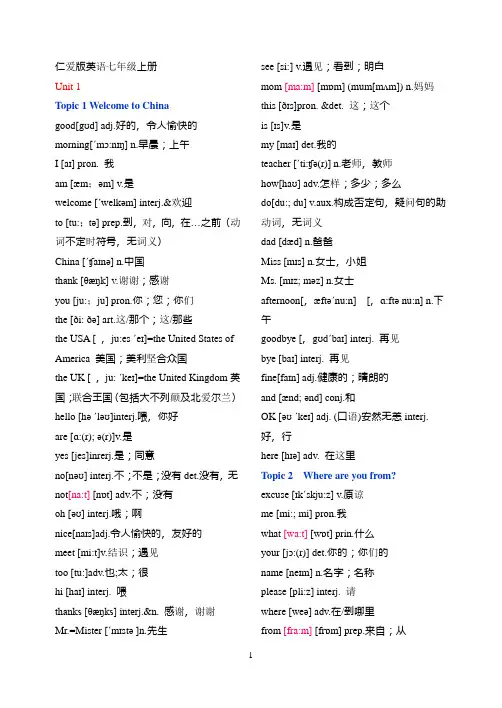
仁爱版英语七年级上册Unit 1Topic 1 Welcome to Chinagood[gʊd] adj.好的,令人愉快的morning[´mɔ:nɪŋ] n.早晨;上午I [aɪ] pron. 我am [æm;əm] v.是welcome [´welkəm] interj.&欢迎to [tu:;tə] prep.到,对,向,在…之前(动词不定时符号,无词义)China [´ʧaɪnə] n.中国thank [θæŋk] v.谢谢;感谢you [ju:;ju] pron.你;您;你们the [ði: ðə] art.这/那个;这/那些the USA [ ,ju:es ´eɪ]=the United States of America 美国;美利坚合众国the UK [ ,ju: ´keɪ]=the United Kingdom英国;联合王国(包括大不列颠及北爱尔兰)hello [hə ´ləʊ]interj.喂,你好are [ɑ:(r); ə(r)]v.是yes [jes]inrerj.是;同意no[nəʊ] interj.不;不是;没有det.没有,无not[na:t] [nɒt] adv.不;没有oh [əʊ] interj.哦;啊nice[naɪs]adj.令人愉快的,友好的meet [mi:t]v.结识;遇见too [tu:]adv.也;太;很hi [haɪ] interj. 喂thanks [θæŋks] interj.&n. 感谢,谢谢Mr.=Mister [´mɪstə ]n.先生see [si:] v.遇见;看到;明白mom [ma:m] [mɒm] (mum[mʌm]) n.妈妈this [ðɪs]pron. &det. 这;这个is [ɪs]v.是my [maɪ] det.我的teacher [´ti:ʧə(r)] n.老师,教师how[haʊ] adv.怎样;多少;多么do[du:; du] v.aux.构成否定句,疑问句的助动词,无词义dad [dæd] n.爸爸Miss [mɪs] n.女士,小姐Ms. [mɪz; məz] n.女士afternoon[,æftə´nu:n] [,ɑ:ftə nu:n] n.下午goodbye [,gʊd´baɪ] interj. 再见bye [baɪ] interj. 再见fine[faɪn] adj.健康的;晴朗的and [ænd; ənd] conj.和OK [əʊ ´keɪ] adj. (口语)安然无恙interj. 好,行here [hɪə] adv. 在这里Topic 2 Where are you from?excuse [ɪk´skju:z] v.原谅me [mi:; mi] pron.我what [wa:t] [wɒt] prin.什么your [jɔ:(r)] det.你的;你们的name [neɪm] n.名字;名称please [pli:z] interj. 请where [weə] adv.在/到哪里from [fra:m] [frɒm] prep.来自;从Canada [´kænədə] n.加拿大America [ə´merɪkə] n.美国Japan [ʤə´pæn] n.日本England [´ɪŋglənd] n.英国they [ðeɪ] pron. 他/她/它们who [hu:] pron. 谁Cuba [ kju:bə] n.古巴he [hi:; hi] pron.他she [ʃi:; ʃi] pron. 她look [lʊk] v.看;看起来telephone [´telɪfəʊn] n.电话number [´nʌmbə(r)] n.(NO.)号码;数字;数量it [ɪt] pron.它very [´veri] adv.非常much [mʌʧ] adv.非常,很;det. 多少,许多,大量very much 非常,很that [ðæt] pron.&det. 那,那个zero [´zɪrəʊ] [´zɪərəʊ] num.零one [wʌn] num.一pron. 一(个,只…)two [tu:] num.二three [θri:] num.三four [fɔ(r)] num.四five [faɪv] num.五six [sɪks] num.六seven [´sevən] num.七eight [eɪt] num.八nine [naɪn] num.九ten [ten] num.十her [hɜ(r); hə(r)] det.她的pron. 她family [´fæməli] n.家庭;家族Topic 3 How old are you?twelve [twelv] num.十二year [jɪə(r)] n.年old [əʊld]adj.---岁的;老的,旧的class[klæs] [klɑ:s] n.班级,课in [ɪn] prep.在---里;用;以;穿着,戴着adv.在家;在里面grade [greɪd] n.年级eleven [ɪ´levən] n.十一thirteen [,θɜ:(r) ´ti:n] num.十三fourteen [,fɔ(r):´ti:n] num.十四fifteen [,fɪf´ti:n] num.十五sixteen [,sɪks´ti:n] num.十六seventeen [,sevn´ti:n] num.十七eighteen [,eɪ´ti:n] num.十八nineteen [,naɪn´ti:n] num.十九twenty [´twenti] num.二十English [´ɪŋglɪʃ] n.英语adj.英国的;英语的;英国人的an [æn; ən]art.一(个,件……)eraser [ɪ´reɪzər] n.橡皮,黑板擦map [mæp] n.地图pen [pen] n.钢笔pencil [´pensl] n.铅笔desk [desk] n.书桌an [ən] art.一(个,件…)spell [spel] v.拼写a [ə] art.一(个,件…)a [ə; ei]art.一(个,件……)can [kən;kæn] modal v.能,会apple [´æpl] n.苹果toy [tɔɪ] n.玩具wow [waʊ] interj.呀,哇try [traɪ] v.试;试图,努力again [ə´gen] [ə´geɪn]adv.再一次those [ðəʊz] pron. & det.那些book [bʊk] n.书;本子v.预约,预订these [ði:z] pron. & det.这些let [let] v.让help [help] v.& n.帮助ruler [´ru:lə(r) ] n.尺子car [kɑ:(r)] n.小汽车,轿车egg [eg] n.蛋orange [´a:rɪnʤ] [´ɒrɪnʤ]n.柑橘;橘黄色adv.橘黄色的bus [bʌs] n.公共汽车box [ba:ks] [bɒks] n.箱,盒now [naʊ] adv.现在school [sku:l] n.学校Beijing International [,ɪntə(r)´næʃənəl]School 北京国际学校his [hɪs] pron. & det.他的same [seɪm] adj.相同的pron. (和…)同样的事物but [bʌt; bət] conj.但是,可是friend [frend] n.朋友junior [´ʤu:nɪə(r)] adj.初级的high [haɪ] adj.高的adv.在高处,向高处junior high school 初中Review of Unit 1girl [gɜ:(r)l] n.女孩we [wi:;wi] pron.我们student [´stu::dənt] [´stju:dənt] n.学生speak [spi:k] v.讲,说;谈话Unit 2Topic 1 I have a small nose.guess [ges] v.猜have [hæv;həv] v.有;吃;喝small [smɔ:l] adj.小的nose [nəʊz] n.鼻子has [hæs]v.有(have的第三人称单数形式)big [bɪg] adj.大的eye [aɪ] n.眼睛know [nəʊ] v.知道;认识right [raɪt] adj.正确的;右边的n.右边ear [ɪə] n.耳朵hair [heə(r)] n.头发head [hed] n.头face [feɪs] n.脸neck[nek] n.脖子mouth [maʊθ] (pl. mouths[mauðz]) n.嘴round [raʊnd] adj.圆形long [lɔ:ŋ] adj.长的wide [waɪd] adj.宽的favorite [´feɪvərɪt] (favourite BrE) adj. 最喜爱的n.特别喜欢的人/物actor [´æktə(r)] n.演员Chinese [,ʧaɪ´ni:z] n.中国人;汉语adj. 中国的;中国人的;汉语的does [dʌz]v.(do的第三人称单数)arm[ɑ:m] n. 胳膊hand [hænd] n.手leg[leg] n.腿foot[fut](pl. feet[fi:t])n.脚;英尺short [ʃɔ:(r)t]adj.短的;矮的boy [bɔɪ]n.男孩come[kʌm] v.来,来到come from 出生于;来自sister [´sɪstə(r)] adj.姐,妹different [´dɪfrənt] adj.不同的knife[naɪf](pl. knives[naɪvz])n小刀Topic 2 What does she look like? black [blæk]adj.黑色的n.黑色blond[bla:nd] [blɒnd]adj.金黄色的blue [blu:] adj.蓝色的n.蓝色color[´kʌlə(r)] (color BrE) n.颜色v.给…着色,涂色pink [pɪŋk] n.粉红色adj.粉红色的red [red]n.红色adj.红色的purple[´pɜ(r):pl] n.紫adj.紫色的brown [braʊn]n.棕色adj.棕色的gray[greɪ](grey BrE)n.灰色adj.灰色的yellow[´jeləʊ] n.黄色adj.黄色的green [gri:n]n.绿色adj.绿色的white[waɪt] n.白色adj.白色的give [gɪv] v.给letter[´letə] n.信:字母sorry [´sa:ri] [´sɔri] interj.对不起,抱歉adj.难过的like [laɪk] perp.像;像…一样v.喜欢;喜爱tall [tɔ:l] adj.高的will [wɪl] v.会;将for[fɔ:(r); fə(r)]prep.(表示对象,用途等)给;因为…;对于…young [jʌŋ]adj.年轻的man [mæn] (pl. men)n.男人woman[´wʊmən](pl.women [´wɪmɪn])n.成年女子,妇女snowman[´snəʊmæn] (pl.snowmen[ snəʊmen])n.雪人want[wa:nt] [wɒnt] v. 想要;需要buy [baɪ]v.买T-shirt [´ti:ʃɜ(r)t]n.T恤衫cap[kæp] n.便帽pair [peə(r)] n.一对;一双of[ɔv; əv]prep.表示,数量,其中)的shoe [ʃu:] n.鞋coat [kəʊt]n. 外套;大衣dress [dres] n.连衣裙pants[pænts] (trousers[´traʊzə(r)z]BrE)n.(pl.)裤子skirt [skə: (r)t] n.(女式)短裙glove [glʌv]n.(分手指的)手套at [æt; ət] prep.向;在(几点钟);在(某处)look at 看着photo [´fəʊtəʊ]n.照片strong[strɔ:ŋ] [strɒŋ] adj.强壮的happy [´hæpi] adj.幸福的,快乐的;高兴地next [nekst]adj.下一个的adv.随后next to 在…近旁,紧邻shirt[ʃɜ:t] n.(尤指男式)衬衫cool [ku:l] adj.酷;凉爽的other [´ʌðə(r)] pron. &adj.另外,其他Topic 3 Whose cap is it?mine [maɪn] pron.我的whose [hu:s] det. &.pron.谁的then [ðen] adv.那么;那时;然后yours [jɔ:(r)z] pron.你的;你们的hers[hɜ:(r)z] pron.她的ours [a: (r)z] [´aʊə(r)z]pron.我们的theirs [ðeəz] pron.他/她/它们的bike[baɪk] n.自行车cat [kæt] n.猫our [a: (r); ´aʊə (r)] det.我们的banana[bə´nænə] [bə´nɑ:nə] n.香蕉their [ðeə]det.他/她/它们的jacket [´ʤækɪt] n.夹克衫;短上衣think [θɪŋk] v.想,认为;思考schoolbag [´sku:lbæg] n.书包baby [´beɪbi] n.动物幼崽;婴儿new [nu:] [nju:] adj.新的classmate[´klæsmeɪt] [´klɑ:smeɪt]n.同班同学clothes [kləʊðz; kləʊz] n.(pl.)衣服us [ʌs; əs] pron.我们find[faɪnd] v.找到him [hɪm] pron.他police[ pə ´li:s] n.警察Unit 3Topic1 Does he speak English?could [kʊd; kəd] modal v.可以;(can 的过去式)能tell [tel] v.告诉sure [ʃuə(r)] adv.(表示同意)当然adj.确信的,肯定的pen pal[´pen pæl] =penfriend [´penfrend]n.笔友some [sʌm;səm] det.&pron.一些with[wɪð]prep.具有;和;用problem[ ´pra:bləm] [ ´prɒbləm] n.问题well [wel] adv.很好地;充分地interj.好吧,那么;adj.健康的;良好的often [´ɔ:f(tə)n] [´ɒf(tə)n] adv.经常lot [la:t] [lɒt] pron.许多a lot 许多about [ə´baʊt]prep.关于adv. 大约live[lɪv] v.居住;生活say [seɪ] v.说,讲visit [´vɪzɪt] v.&n.参观;拜访many [´meni] det.许多的pron.许多(人或物)little [´lɪtl] adv.一点儿,稍许adj.小的a little 一点儿so [səʊ] conj.因此,所以adv.如此,这么them [ðem; ðəm] pron.他/她/它们each [i:ʧ] pron.各个,每个each other 互相,全部all[ɔ:l] pron.所有,全部not…at all 一点儿也不,根本不read [ri:d] v.读;朗读a lot of 许多people [´pi:pl] n.人;人们every [´evri] det.每一个,每个day[deɪ]n. 一天,一日;白天Topic 2 What does your mother do? home[həʊm] adv.到家;在家n.家kid [kɪd] n.小孩adv.开玩笑glad [glæd] adj.高兴地,愉快的mother [´mʌðə]n. 母亲father[´fɑ:ðə] n.父亲doctor[´da:ktə(r)] [´dɒktə(r)]n.医生parent [´perənt] [´pærənt] n.父(母)亲office [´ɔ:fɪs] [´ɒfɪs] n.办公室worker [´wɜ(r):kə(r)] n.工人driver [´draɪvə(r)] n.司机farmer[´fɑ:mə] n.农民cook[kʊk] n.厨师v.烹饪,烹调nurse[nɜ:(r)s] n. 护士show [ʃəʊ] v.给…看,出示;表明n.演出;展示;展览work[wɜ:(r)k] v.工作;运转n.工作,劳动hospital [´ha:spɪtl] [´hɒspɪtl] n.医院restaurant [´restəra:nt] [´restərɒnt]n.餐馆on [a:n] [ɒn] perp.在…上;关于farm[fɑ:(r)m] n. 农场teach [ti:ʧ] v.教act[ækt] v. 扮演,表演drive [draɪv] v.驾驶,开车aunt [ænt][ɑ:nt] n.婶母,伯母,姨母,舅母,姑母uncle [´ʌŋkl] n.叔,伯,舅,叔父,姑父,姨父brother [´brʌðə(r)] n.兄,弟sofa [´səʊfə] n.沙发grandparent [´grænperənt] [´grænpεərənt] n.祖父(母),外祖父(母)cousin[´kʌzn] n. 堂(表)姐妹;堂(表)兄弟daughter [´dɔ:tə(r)] n.女儿tree[tri:] n.树family tree 家谱son[sʌn] n.儿子cute[kju:t] adj.可爱的;机灵的play [pleɪ]v.玩耍;演奏n.戏剧its [ɪts] det.它的;他的;她的love [lʌv] v. & n.爱;喜爱Topic3 What would you like to drink? yourself[jɔ(r) ´self] (pl.yourselves[jɔ:(r)selvz])pron.你自己would[wʊd] modal v.打算,想要;(will的过去式)将会fish[fɪʃ] n.鱼 v. 钓鱼chicken[´ʧɪkɪn] n.鸡肉;鸡rice [raɪs]n.大米;稻米drink [drɪŋk] v.喝n.饮料juice[ʤu:s] n.果汁milk [mɪlk]n.牛奶idea[aɪ´dɪ:ə] [aɪ´dɪə] n.主意water[´wa:tə(r)] [´wɔ:tə(r)] n.水vegetable [´veʤtəbl] n.蔬菜bread [bred] n.面包hamburger [´hæmbɜ:(r)gə(r)] n.汉堡包usually[ ˊ ju:ʒʊəli; ˊ ju:ʒəli ] adv.通常地breakfast [ ˊbrekfəst]n.早餐lunch[lʌnʧ] n.午餐dinner [´dɪnə]n.晚餐food[fu: d] n.食物may [meɪ]v.可以;可能take [teɪk] v.拿;乘坐;花费;服用;携带order [´ɔ: (r)də(r)] n.命令;顺序v. 命令;点菜;组织sir[sɜ:(r);sə(r)] n.先生something[´sʌmθɪŋ]pron.某物/事glass [glæs] [glɑ: s] n.(玻璃)杯mm [m] interj.嗯eat [i:t] v.吃out [aʊt] adv.在(到)外面why [waɪ] adv. 为什么dear [dɪə(r)] adj.亲爱的;昂贵的kind [kaɪnd] adj.友好的n.种;类be [bi:;bi] v.在;是Review of Unit 3there[ðeə(r)] adv.在哪里go [gəʊ] v.走,去get[get] v.得到;到达zoo[zu:] n.动物园Sunday [´sʌndeɪ;´sʌndɪ] n.星期日need [ni: d] v.& modal v.需要dog [dɔ:g] [dɒg] n.狗look forward[´fɔ:(r)wə(r)d] to 盼望Unit 4Topic 1 What can I do for you?shop [ʃa:p] [ʃɒp] n.商店v. 购物madam [´mædəm] n.夫人;女士try[traɪ] on 试穿seventy [´sevənti] num.七十thirty [´θɜ:ti] num.三十forty [´fɔ:ti] num.四十fifty [´fɪfti] num.五十sixty [´sɪksti] num.六十eighty[´eɪti] num.八十ninety [´naɪnti] num.九十hundred [ ´hʌndrəd] num.百just [ʤʌst] adv.仅仅;只是think of 认为;想起think about 考虑anything [ ´eniθɪŋ] pron.任何东西(事物)mean [mi:n] v.意思是kilo[´kɪləʊ] =kilogram[´ kɪləʊgræm] n.千克bag[bæg] n.袋子loaf[ləʊf] n.一条(面包)bar[bɑ:]n.(长方形)条,块;酒吧bottle [´ba:tl] [´bɒtl]n.一瓶(的量);瓶子tin [tɪn] n.听,罐save [seɪv]v. 节省;攒钱;挽救chocolate [´ʧa:kəlɪt] [´ʧɒkəlɪt] n. 巧克力Coke [kəʊk]n.可乐do some shopping购物any[´eni] det.任何的;任一的pron.任一,任何,一些heavy [ ´hevi] adj.重的er [ə] interj.哦,嗯Topic 2 Would you like to cook with us?free [fri:] adj.空闲的;免费的up[ʌp] adv. (尤指异常或不愉快的事)发生;向上West Hill 西山picnic [´pɪknɪk] n.野餐call[kɔ:l]v.(给…打电话);称呼when [wen] adv.什么时候,何时conj.当…的时候tomorrow[tə´ma:rəʊ] [tə´mɒrəʊ]adv.明天sing[sɪŋ]v.唱歌song [sɔ:ŋ] [sɒŋ] n.歌曲,歌have to 不得不fly [flaɪ] v.放(风筝、飞机模型等);飞行kite[kaɪt] n.风筝time[taɪm] n.时间;次,回bow-wow[bəʊ-waʊ]n.狗汪汪叫声ask [æsk] [ɑ:sk] v.请求;邀请;询问back[bæk]adv.回到(原处);往后n.背部,后部evening[´i:vnɪŋ ] n.晚上;傍晚way [weɪ] n.路,道路;方式h homework [ ´həʊmwɜ:k] n.家庭作业do one’s home work 做家庭作业Topic 3 What time is it now?panda [´pændə] n.熊猫monkey [´mʌŋki] n.猴子lion[´laɪən] n.狮子tiger [´taɪgə] n.老虎elephant [´elɪfənt] n.象o’clock[ə´kla:k] [ə´klɒk] adv.……点钟past [pæst] [pɑ:st] prep. 在…之后;超过;经过 n.过去,往事quarter[´kwɔ:(r)tə(r)]n.一刻钟;四分之一half [hæf] [hɑ:f] n.半,一半a.m. [ ´eɪæm] 上午,午前clever[´klevə(r)]adj.聪明的聪颖的animal [´ænɪməl] n.动物hour [´aʊə(r)] n.小时later[´leɪtə(r)] adv.以后;后来today [tə´deɪ] adv. 在今天;当今n. 今天,当今get up 起床,起来meat[mi:t]n.肉类;(某种)食用肉rabbit[´ræbɪt] n.兔Review of 3-4p.m. [´pi:æm]下午,午后if[ɪf] conj.如果,是否email [´i:meɪl] n.电子邮件v. 用电邮发送。
仁爱版英语七年级上册Unit3 Topic3 Section A公开课教案教材:仁爱版英语七年级上册Unit3 Topic3 Section AI. Teaching books: Project English. Unit3 Topic3 Section AII. Teaching tools: tape recorder, word cards, PowerpointIII. Teaching methods: Teaching as a whole, visual and situational method, and team cooperation.IV. Teaching aims and demands:1. Get familiar with the food vocabulary.2. Learn the use of countable and uncountable nouns.3. Learn how to entertain guests to dinner at home and the response.4. Key sentences:1) What would you like to have/drink? -- I’d like some …2) Would you like some …? -- Yes, please. / No, thanks.V. Teaching Procedures:Step 1 Organization and revision1. Task presentation:Get familiar with the food vocabulary.Learn the use of countable and uncountable nouns.Learn how to entertain guests to dinner at home and the response.2. Listen to the song of ABC. While listening, get students find out food words from the song.3. Check how much students have learnt about the new words:Ss show pictures to partners and ask each other to spell the words. Consolidation: Teacher review new words with the whole class (show pictures).Step 2 Presentation1. Learn countable and uncountable nouns:Classify the words on the blackboard into countable and uncountable groups:[C]: egg, vegetable, noodle, cake[U]: fish, meat, rice, chicken, tea, milk, waterPlay a game:S1: water S2: some water, vegetable S3: some vegetables, milk S4: some mil k …Consolidation: Practice those words with sentences:I like …(s) very much. I don’t like …(s) at all.Students work with partners, then make a report.2. Ask and answer:Review some words with students. (show word cards)Suppose you in vite some classmates to dinner at your home, what should you say?First let us learn some key sentences:1) What would you like to have/drink? -- I’d like some …2) Would you like some …? -- Yes, please. / No, thanks.Ss work in pairs to practice the key sentences, then act out the dialogues.3. Activity 1aListen and understand.Listen again, then read after the tape.Point out some useful expressions:3) What about you, ××? -- I’d like some …4) May I have some …? -- Here you are.5) Help yourselves.4. Activity 2Ss listen to the tape and fill in the blanks. Check the answers.Point out useful expressions:6) Why not have some …? -- Good idea! Thanks!Step 3 Consolidation & Practice1. Work in groups and study the conversation in activity 1a and activity2. Then work out to make a similar conversation with your group members. (Teacher’s guide: Ss review the key sentences and useful expressions they just learned together before they get to make a new conversation.)2. Act it out in class.Step 4 Project1. Summary: Check out whether Ss finish the tasks or not. (Briefly review the words, sentences and grammar we’ve learnt today.)2. Homework:① Finish your exercise sheet.Write down the countable nouns and uncountable nouns you lear n today.Make a survey of students in other groups about foods they like and dislike. Then write a new conversation of “Entertaining guests to dinner”.② Make a menu with your group members! (a daily menu, may look up dictionaries for new words, put some beautiful pictures in your menu)《仁爱版英语七年级上册Unit3 Topic3 Section A》教案乌敦套海中学李晓娟I. Teaching books: Project English--- Unit3 Topic3 Section A.II. Teaching tools: tape recorder, word cards, Powerpoint.III. Teaching methods: Teaching as a whole, visual and situational method, and team cooperation.IV. Teaching aims and demands:1. Get familiar with the food vocabulary.2. Learn the use of countable and uncountable nouns.3. Learn how to entertain guests to dinner at home and the response.4. Key sentences:eg: What would you like to have/drink? -- I’d like some …Would you like some …?-- Yes, please. / No, thanks.V. Teaching Procedures:Step 1: Organization and revision:1. Task presentation.2. Get familiar with the food vocabulary.3. Learn the use of countable and uncountable nouns.4. Learn how to entertain guests to dinner at home and the response.5. Listen to the song of ABC. While listening, get students find out food words from the song.6. Check how much students have learnt about the new words:Ss show pictures to partners and ask each other to spell the words.Consolidation: Teacher review new words with the whole class (show pictures).Step 2: Presentation:1. Learn countable and uncountable nouns.2. Classify the words on the blackboard into countable and uncountable groups:[C]: egg, vegetable, noodle, cake[U]: fish, meat, rice, chicken, tea, milk, water3. Play a game:S1: water S2: some water, vegetable S3: some vegetables, milk S4: some milk …4. Consolidation: Practice those words with sentences.eg:I like …(s) very much. J I don’t like …(s) at all.( Students work with partners, then make a report. )5. Ask and answer:1)Review some words with students. (show word cards)2) T:Suppose you invite some classmates to dinner at your home, hat should you say? First let us learn some key sentences:eg:What would you like to have/drink? -- I’d like some …Would you like some …?-- Yes, please. / No, thanks.(Ss work in pairs to practice the key sentences, then act out the dialogues.)6. Activity 1a:1)Listen and understand.2)Listen again, then read after the tape.3)Point out some useful expressions:eg: What about you, ××? -- I’d like some …May I have some …?-- Here you are.Help yourselves.7. Activity 2 :1)Ss listen to the tape and fill in the blanks. Check the answers.2)Point out useful expressions:eg: Why not have some …?-- Good idea! Thanks!Step 3: Consolidation and Practice1. Work in groups and study the conversation in activity 1a and activity2. Then work out to make a similar conversation with your group members. (Teacher is guide;Ss review the key sentences and useful expressions they just learned together before they get to make a new conversation.)3. Act it out in class.Step 4: ProjectSummary: Check out whether Ss finish the tasks or not. (Briefly review the words, sentences and grammar we’ve learnt today.)Step5: Homework:1. Finish your exercise sheet.2. Write down the countable nouns and uncountable nouns you learn today.3. Make a survey of students in other groups about foods they like and dislike. Then write a new conversation of “Entertaining guests to dinner”.4. Make a menu with your group members! (a daily menu, may look up dictionaries for new words, put some beautiful pictures in your menu).VI.教后反思:。
仁爱版七年级上册Unit1MakingNewFriends交新朋友Topic1WelcometoChina!欢迎来到中国!SectionA1aGoodmorning!I’mKangkang.早上好,我是康康!Goodmorning!早上好!WelcometoChina!欢迎来到中国!Thankyou.谢谢!2a1.Hello!你好!Hello!你好!I’mKangkang.AreouyMichael?我是康康。
你是迈克吗?Yes,Iam.是的,我是。
2.Hello!AreyouMaria?你好!你是玛丽娜吗?No,I’mnot.I’mJane.不,我不是。
我是简。
Oh,nicetomeetyou,Jane.哦。
很高兴见到你,简。
Nicetomeetyou,too.我也很高兴见到你。
3.Hi,Maria!你好,玛丽娜!Hi,Kangkang.你好,康康!WelcometoChina!欢迎来到中国!Thanks.谢谢!SectionB1aGoodmorning,Mr.Brown!Nicetoseeyou.早上好,布朗先生!很高兴见到你。
Goodmorning,Maria!Nicetoseeyou,too.早上好,玛丽娜!我也很高兴见到你。
Mom,thisismyteacher,Mr.Brown.Mr.Brown,.thisismymom.妈妈,这是我的老师,布朗先生。
布朗先生,这是我的妈妈。
Howdoyoudo?你好!Howdoyoudo?你好!Topic2Whereareyoufrom?你来自哪里?SectionA1aExcuseme,areyouJane?打扰一下,你是简吗?Yes,Iam.What’syourname,please?是的,我是。
请问,你叫什么名字?MynameisSally.Whereareyoufrom?我的名字是莎丽。
你来自哪里?I’mfromCanada.AreyoufromCanada,too?我来自加拿大。
Unit 3 Topic 1(满分100分时间90分钟)第一部分听力(20分)Ⅰ.听句子,选择正确图片。
每个句子读两遍。
(5分)( )1.( )2.( )3.( )4.( )5.Ⅱ.听句子,选择正确答语。
每个句子读两遍。
(5分)( )6. A. Yes, it is. B. No problem. C. I like it a lot.( )7. A. Thank you. B. What’s your name? C. Sure. I’m Linda. ( )8. A. Yes, I like it very much. B. You are welcome. C. Sure. I have a good one. ( )9. A. Yes, she is. B. Yes, it is. C. Yes, she does. ( )10. A. She wants to go to Canada. B. She is my sister. C. Yes, she is.Ⅲ.听对话,判断下列句子的正(T)误(F)。
每组对话读两遍。
(5分)( )11. Linda lives in China.( )12. The boy’s name is David.( )13. Jim wants to visit Shanghai.( )14. The man is Jim’s pen pal.( )15. The man has a pet cat.Ⅳ.听短文,选择正确答案。
短文读两遍。
(5分)( )16. Mike is David’s ____.A. brotherB. pen palC. classmate( )17. Mike comes from ____.A. EnglandB. the U.S.A.C. China( )18. David’s pen pal is ____ years old.A. 12B. 13C. 14( )19. Mike often goes ____.A. to the English SchoolB. to schoolC. to the Chinese School ( )20. Mike wants to study ____.A. ChineseB. EnglishC. Japanese(日语)第二部分基础知识运用(55分)Ⅰ.单项选择。
Unit 1 Making New Friends 交新朋友Topic 1 Welcome to China!欢迎来到中国!Section A1aGood morning! I’m Kangkang.早上好,我是康康!Good morning!早上好!Welcome to China!欢迎来到中国!Thank you. 谢谢!2aHello!你好!Hello!你好!I’m Kangkang. Are you Michael我是康康。
你是Michael吗Yes, I am. 是的,我是。
2.Hello!Are you Maria 你好!你是Maria吗No, I’m not. I’m Jane. 不,我不是。
我是Jane。
Oh, nice to meet you, Jane. 哦。
很高兴见到你,Jane。
Nice to meet you, too. 我也很高兴见到你。
3.Hi, Maria! 你好,Maria!Hi, Kangkang. 你好,康康!Welcome to China! 欢迎来到中国!Thanks. 谢谢!Section BGood morning, Mr. Brown! Nice to see you.早上好,布朗先生!很高兴见到你。
Good morning, Maria! Nice to see you, too. 早上好,Maria!我也很高兴见到你。
Mom, this is my teacher, Mr. Brown. Mr. Brown, this is my mom.妈妈,这是我的老师,布朗先生。
布朗先生,这是我的妈妈。
How do you do 你好!How do you do 你好!Topic 2 Where are you from 你来自哪里Section AExcuse me, are you Jane打扰一下,你是Jane吗Yes, I ’s your name,please是的,我是。